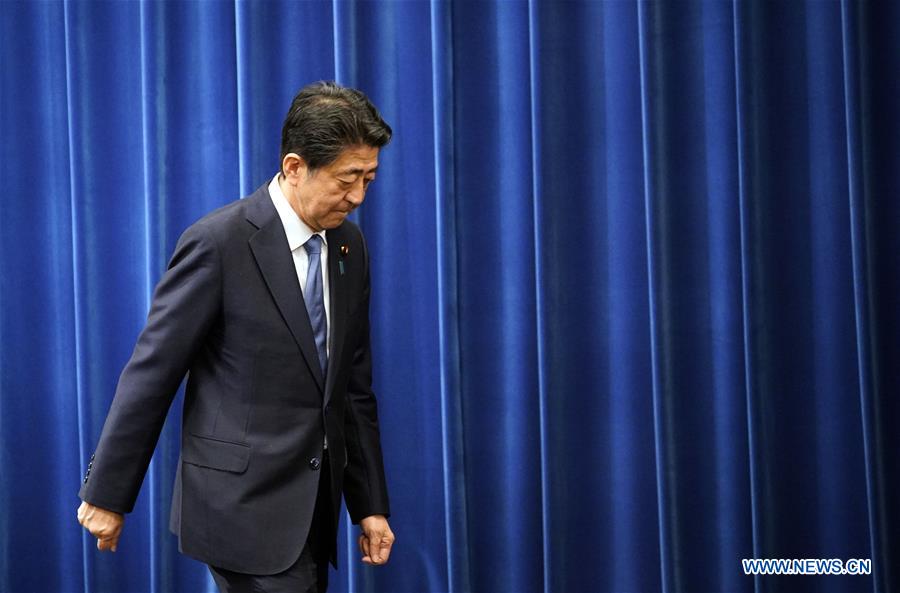
Japanese Prime Minister Shinzo Abe leaves after a press conference in Tokyo, Japan, Aug. 28, 2020. Japanese Prime Minister Shinzo Abe said at a press conference Friday that he would step down from his post due to health concerns. (Franck Robichon/Pool via Xinhua)
TOKYO, Aug. 28 (Xinhua) -- Japanese Prime Minister Shinzo Abe said at a press conference Friday that he would step down from his post due to health concerns, bringing an end to his record tenure of nearly eight years.
However, the prime minister said that he planned to continue his political career and would run in the next general election to be held by the fall of 2021.
"As I am no longer in a condition to respond confidently to the mandate of the people, I have decided I should not stay in the prime minister's post," he said at a nationally televised press conference, apologizing to the Japanese people for stepping down at this time.
His resignation was meant to avoid his health issue from creating leadership vacuum, Abe said, adding that now was the only time he could resign amid the COVID-19 pandemic.
Abe said that his health condition worsened and he began feeling severe fatigue in July, adding that he lost confidence in his ability to serve Japanese people.
While the race for Japan's next leader is already intensifying, Abe said he would remain in office until his successor is chosen by the ruling Liberal Democratic Party (LDP) but he stopped short of naming his preferred successor.
According to local media reports, the LDP will decide next Tuesday on how to hold a leadership election, with parliamentarians and representatives of local chapters likely casting ballots.
The prime minister revealed that test results in June showed his ulcerative colitis, an intestinal disease that led his first one-year stint to end abruptly in 2007, was beginning to resurface.
He said he had been able to keep the illness under control for nearly eight years into his tenure but now he would receive new treatment and required prolonged care.
The politician also expressed regret towards many of his unrealized political ambitions at the press conference.
It was "gut-wrenching" to have to leave his post while still trying to guide the Japanese economy out of deflation, sign a peace treaty with Russia, and amend the Constitution, he said.
Abe's decision to quit came as a surprise to many, including his close aides. "I was taken aback," Tomomi Inada, one of the aides, has said, noting the announcement was all too sudden and unexpected.
Although Abe will leave office before seeing the Tokyo Olympics slated to be staged next summer, he said Japan has the responsibility to prepare for the Tokyo Olympics.
Abe also said that the downtrend in COVID-19 cases prompted him to resign, adding that he thought now was the right time to step down because the spread of COVID-19 has slowed.
At a government meeting on Friday, the prime minister said that Japan aimed to secure COVID-19 vaccinations for all citizens by the first half of 2021.
He also said he has been able to compile new measures against the virus, including expanding testing capacity to 200,000 a day.
Speculations about the Japanese premier's deteriorating health have been swirling of late and amplified by two trips to a Tokyo hospital within a week.
Abe's first admission to hospital on Aug. 17 for what was described as a "health check up" that lasted more than seven hours stoked concerns about his health.
On Aug. 24, Abe revisited the Keio University Hospital in Tokyo for four hours to receive the results of the checkup and have more tests.
On the same day, he became Japan's longest-serving leader with the most consecutive days in office, surpassing the previous record of 2,798 days held by his uncle Eisaku Sato. Enditem